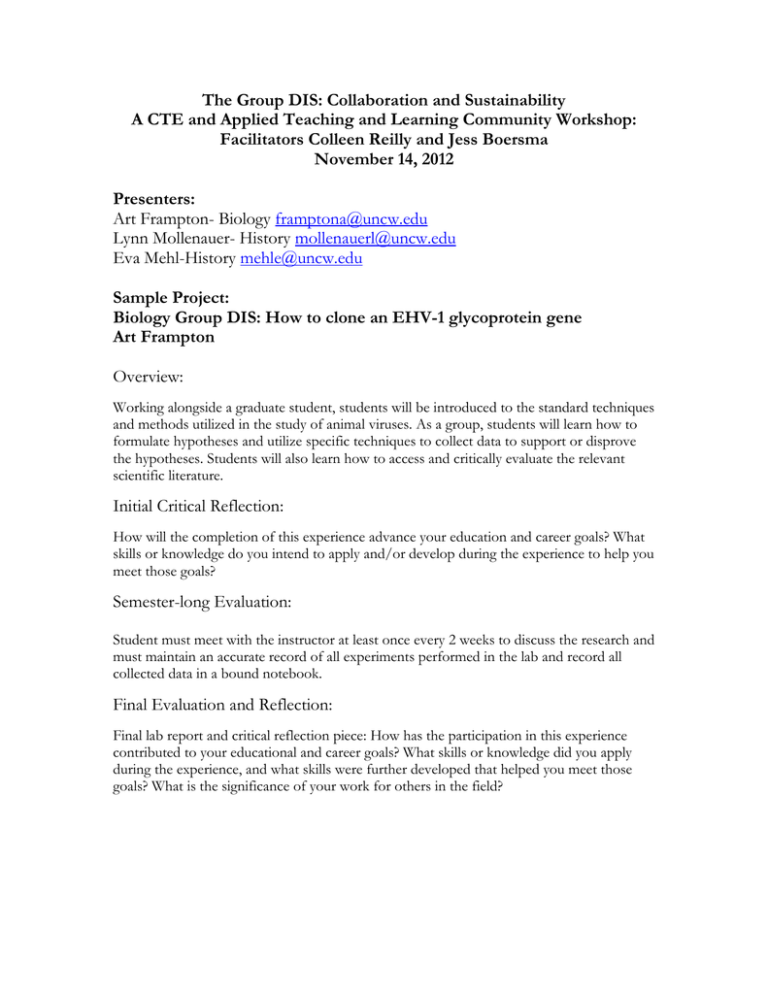
The Group DIS: Collaboration and Sustainability
A CTE and Applied Teaching and Learning Community Workshop:
Facilitators Colleen Reilly and Jess Boersma
November 14, 2012
Presenters:
Art Frampton- Biology framptona@uncw.edu
Lynn Mollenauer- History mollenauerl@uncw.edu
Eva Mehl-History mehle@uncw.edu
Sample Project:
Biology Group DIS: How to clone an EHV-1 glycoprotein gene
Art Frampton
Overview:
Working alongside a graduate student, students will be introduced to the standard techniques
and methods utilized in the study of animal viruses. As a group, students will learn how to
formulate hypotheses and utilize specific techniques to collect data to support or disprove
the hypotheses. Students will also learn how to access and critically evaluate the relevant
scientific literature.
Initial Critical Reflection:
How will the completion of this experience advance your education and career goals? What
skills or knowledge do you intend to apply and/or develop during the experience to help you
meet those goals?
Semester-long Evaluation:
Student must meet with the instructor at least once every 2 weeks to discuss the research and
must maintain an accurate record of all experiments performed in the lab and record all
collected data in a bound notebook.
Final Evaluation and Reflection:
Final lab report and critical reflection piece: How has the participation in this experience
contributed to your educational and career goals? What skills or knowledge did you apply
during the experience, and what skills were further developed that helped you meet those
goals? What is the significance of your work for others in the field?
The Academic Colloquium as a Group DIS:
History 295: Readings in History
Lynn Mollenauer
Overview:
An academic colloquium is designed to examine a topic based on careful consideration of
published sources.
Topics vary by semester.
History 295 courses are taught in 2 sections with a maximum of 5 students.
Classes are team-taught by two faculty members.
Topics include:
“Command and Leadership,” “Travel, Sex and Science in Early Modern Empires,”
“European Expansion and Gender Issues” and other areas related to the professors’ fields
of research.
Sample Colloquium Project:
History 295: “European Expansion and Gender Issues”
Eva Mehl
This course looks at the nature of early colonial encounters, with a focus on the subtopics of
gender and sexuality. We read about the nature of life at sea, the homosocial aspects of
shipboard and colonial societies, the nature of cross-cultural encounters during the colonial
era, and the ideas and behaviors associated with sexuality, gender identity, sexual preference
and sexual license.
Methodology:
The focus is on identifying and discussing the various interpretations of the topic presented
by various authors or schools of thought.
Students develop abilities to critique arguments and analyze secondary literature-particularly
with regard to argument, thoroughness, documentation, insight, and logic.
Assessments:
Leading discussions
Critical literary reviews
Historiographical Essay
More information about these projects is available on the Applied
Learning Website: http://uncw.edu/cte/resources/ideabank.html



